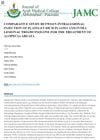April 2023 in “Journal of Investigative Dermatology” Interface dermatitis is the most common skin change in drug-induced hypersensitivity syndrome.
[object Object] 75 citations,
September 1971 in “British Journal of Dermatology” Both steroids effectively promote hair growth for at least 9 months.
 9 citations,
December 2020 in “Journal of The American Academy of Dermatology”
9 citations,
December 2020 in “Journal of The American Academy of Dermatology” Platelet-rich plasma may help restore immune balance in bald patches, but its effectiveness in treating hair loss is limited.
 November 2022 in “The journal of investigative dermatology/Journal of investigative dermatology”
November 2022 in “The journal of investigative dermatology/Journal of investigative dermatology” TYK2 inhibition may help treat alopecia areata by promoting hair growth and reducing immune response.
 September 2022 in “Journal of Ayub Medical College Abbottabad”
September 2022 in “Journal of Ayub Medical College Abbottabad” Steroid injections are more effective than platelet rich plasma for treating patchy hair loss.
Intralesional methotrexate effectively treats alopecia areata by reducing TNF-α levels, leading to hair regrowth.
23 citations,
September 2020 in “Journal of Dermatological Science” Targeting Vδ1+T-cells may help treat alopecia areata.
7 citations,
November 1996 in “PubMed” Triamcinolone regrows hair better but relapses more than anthralin.
 3 citations,
May 2023 in “Frontiers in immunology”
3 citations,
May 2023 in “Frontiers in immunology” Faulty inflammasome activation may lead to autoimmune skin diseases and could be a target for new treatments.
1 citations,
April 2019 in “The journal of investigative dermatology/Journal of investigative dermatology” People with Hidradenitis Suppurativa have less diverse skin bacteria and different bacterial metabolism than healthy individuals.
1 citations,
November 2018 in “immuneACCESS” Expanded CD8+ T cells are linked to Alopecia Areata and may cause relapse after treatment.
 January 2024 in “Elsevier eBooks”
January 2024 in “Elsevier eBooks” Increasing regulatory T cells may help treat alopecia areata by reducing autoimmunity and promoting hair growth.
 April 2023 in “Journal of Investigative Dermatology”
April 2023 in “Journal of Investigative Dermatology” Acne patients have higher skin mTORC1 activity, which is reduced by isotretinoin treatment.
June 2017 in “Journal of the American Academy of Dermatology” The new cream is safe and effective for mild to moderate atopic dermatitis.
65 citations,
December 2015 in “Experimental dermatology” Corticosteroid treatment reduces inflammation and alters hair keratins in alopecia areata.
2 citations,
September 2017 in “Journal of Investigative Dermatology” Notch1 signaling is impaired in hidradenitis suppurativa, affecting skin and hair cells.
 1 citations,
April 2024 in “Journal of Autoimmunity”
1 citations,
April 2024 in “Journal of Autoimmunity” Interleukin-15 can help hair growth and protect hair follicles.
 September 2024 in “Journal of the American Academy of Dermatology”
September 2024 in “Journal of the American Academy of Dermatology” Regulatory γδ T cells help protect hair follicles from alopecia areata and promote hair regrowth.
September 2019 in “The journal of investigative dermatology/Journal of investigative dermatology” Certain proteins are significantly increased in the skin of people with hidradenitis suppurativa.
[object Object] September 2019 in “Journal of Investigative Dermatology” Innate lymphoid cells type 1 may contribute to alopecia areata.
220 citations,
May 2017 in “JAMA dermatology” Patients with hidradenitis suppurativa have a different skin microbiome compared to healthy people.
 176 citations,
August 2015 in “The journal of allergy and clinical immunology/Journal of allergy and clinical immunology/The journal of allergy and clinical immunology”
176 citations,
August 2015 in “The journal of allergy and clinical immunology/Journal of allergy and clinical immunology/The journal of allergy and clinical immunology” Alopecia areata involves immune activation in the scalp, suggesting treatments targeting TH1, TH2, and IL-23 pathways.
 2 citations,
April 2018 in “Journal of Investigative Dermatology”
2 citations,
April 2018 in “Journal of Investigative Dermatology” Frontal fibrosing alopecia shows increased inflammation and JAK-STAT pathway activity without reduced hair proteins.
1 citations,
August 2016 in “Journal of Investigative Dermatology” Vδ1+ T-cells in the skin contribute to hair loss in alopecia areata and could be targeted for treatment.
1 citations,
April 2016 in “Journal of Investigative Dermatology” Targeting specific T cells may help treat alopecia areata.
1 citations,
June 2006 in “Experimental dermatology” Acetylcholine receptors might be involved in the development of acne inversa and smoking could worsen the condition.
 November 2023 in “The journal of investigative dermatology/Journal of investigative dermatology”
November 2023 in “The journal of investigative dermatology/Journal of investigative dermatology” Blocking TYK2 might be a new way to treat hair loss from alopecia areata.
 April 2023 in “Journal of Investigative Dermatology”
April 2023 in “Journal of Investigative Dermatology” The study created special nanoparticles that effectively deliver an anti-inflammatory drug to treat skin inflammation in psoriasis.
 April 2023 in “Journal of Investigative Dermatology”
April 2023 in “Journal of Investigative Dermatology” Being allergic to linalool, a common fragrance ingredient, might contribute to developing frontal fibrosing alopecia.
 April 2023 in “Journal of Investigative Dermatology”
April 2023 in “Journal of Investigative Dermatology” PTEN was identified as a specific marker for the skin disease cutaneous lupus erythematosus, and it helps increase the expression of harmful type I interferons.













